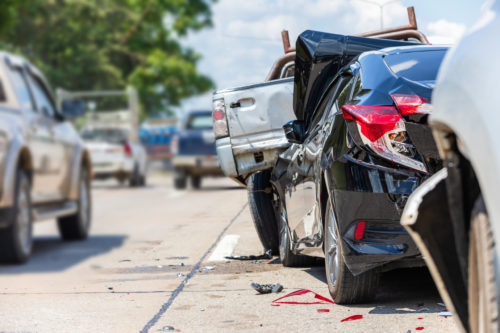Illinois motor vehicle accidents occur for a range of reasons, including excessive speed, driver distraction, fatigue, drug use and alcohol consumption, and weather and road hazards. The Illinois Department of Transportation reports that 319,146 auto collisions occurred across the state in 2018. Such collisions often cause serious injuries or death for the drivers involved, their passengers, or bystanders.

Why Do Illinois Car Wrecks Occur?
Auto collisions happen for a variety of reasons. While drivers may take every precaution to keep themselves and their passengers safe, they cannot prevent all accidents from occurring. Factors such as the roadways or the conditions, as well as the state and actions of drivers, commonly play a role in causing car crashes.
Distractions
Driver distractions often contribute to the auto wrecks in Illinois. Such distractions may include anything that takes a driver’s mind off the operation of his or her vehicle, hands off the steering wheel, or eyes off the road. Multitasking while driving may seem not a big deal or a way to save time. However, doing so may affect motorists’ ability to safely handle their vehicles, or cause them not to have time to respond to the actions of other drivers. A distracted driver may not see dangers that come up on the road.
Speed
A leading cause of serious and fatal crashes, traveling too fast for the road conditions causes numerous auto accidents each year. According to the Illinois DOT, 33.7% of the collisions that occurred across the state in 2018 involved speed. Driving at excessive speeds may cause motorists to lose control of their vehicles or lack the necessary time and distance to identify and react to road hazards or changes in traffic conditions.
Drugs and Alcohol
Driving under the influence of drugs or alcohol causes numerous motor vehicle collisions each year. Alcohol, illicit drugs, and medications prescribed by a physician or purchased over the counter may have effects that impair driver coordination, balance, attentiveness, cognition, and perception. Due to these and other such impairments, motorists may have an increased likelihood of causing or getting into wrecks.
Fatigue
Falling asleep at the wheel creates obvious hazards for drivers. However, driving while fatigued also factors into causing motor vehicle accidents. Sleepiness or fatigue may cause driving impairments such as a reduced ability to focus on the road, altered decision-making and judgment, and decreased reaction times. These impairments may affect people’s abilities to drive safely, which may increase their risk of crashing into pedestrians, objects, or other vehicles.
Weather and Road Hazards
The weather and conditions of the road sometimes play a role in auto collisions. Wind, rain, sleet, snow, and other such precipitation may impair a driver’s visibility. Additionally, weather-related factors, such as wet or icy roads, may create slick conditions that cause drivers to lose control of their vehicles. Drivers may lack time to appropriately react or suddenly swerve to avoid hazards, such as potholes, wild animals, and fallen branches or debris, and crash into other vehicles or objects on the road.
Leave a Reply